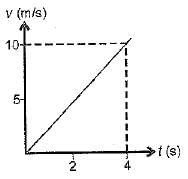MCQ : Force And Laws Of Motion - 1 - Class 9 MCQ
10 Questions MCQ Test Science Class 9 - MCQ : Force And Laws Of Motion - 1
Newton’s third law of motion explains the two forces namely ‘action’ and ‘reaction’ coming into action when the two bodies are in contact with each other. These two forces:


The inertia of an object tends to cause the object ______.
While catching a stone thrown by your friend you pull the hands back to______.
Which one of the following statements is not correct for an object moving along a straight path in an accelerated motion?
The v - t graph of a body of 5 kg moving with the help of a force is shown. Then the force involved is______.

When no external force acts on an object, the physical quantity that remains conserved is______.
According to second law of Newton, force is the cause and the outcome is______.
Which of the following is an equation of motion of a body?
|
84 videos|384 docs|61 tests
|



 = 2.5 m/s2
= 2.5 m/s2











